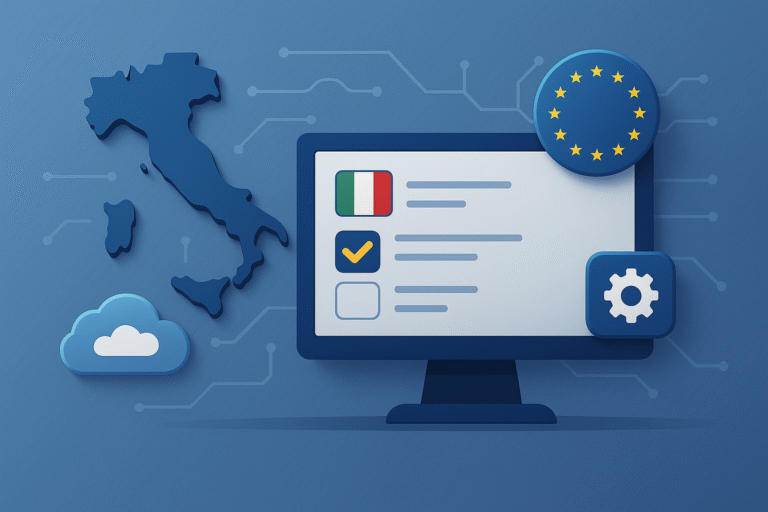
Introduction
Digital transformation is not only about technology—it also concerns the rights of citizens in the digital age. In recent years, the European Union has placed digital citizenship at the core of its policies, aiming to ensure access, security, inclusion, and democratic participation for all.
Digital citizenship goes beyond online public services: it also covers personal data protection, secure digital identity, algorithmic transparency, and the fight against digital inequalities.
👉 To explore how digital tools connect to democracy, also check:
- Digital ID and E-signatures for Participation
- AI and Public Decisions: Opportunities and Risks
- What is Digital Democracy and Why it Matters Today
The European Framework for Digital Citizenship
Over the last two decades, the EU has promoted several strategies to support digitalization, but since 2020, digital citizenship has become central in public policies.
The European Declaration on Digital Rights and Principles (2022)
This declaration works as a “digital constitution” for the EU. It outlines principles such as:
- universal access to connectivity and digital devices,
- privacy and data protection,
- online safety,
- promotion of digital literacy,
- guaranteeing democratic participation through digital tools.
👉 Official text: European Declaration on Digital Rights and Principles
The Digital Compass 2030
In 2021, the European Commission launched the Digital Compass 2030 strategy, with four main goals to be achieved by the end of the decade:
- Digital skills: at least 80% of adults with basic digital skills.
- Secure and sustainable infrastructures: widespread 5G and high-capacity networks across the EU.
- Business digitalization: 90% of SMEs reaching a basic level of digital adoption.
- Digital public services: universal access to key online services, digital health records, and EU-wide digital identity.
These goals directly impact citizens by laying the foundations for an inclusive digital citizenship.
👉 See more: Digital Compass 2030
The European Digital Identity: the EUDI Wallet
One of the flagship projects is the creation of the European Digital Identity Wallet (EUDI Wallet). It will allow every EU citizen to:
- access public and private services across the EU,
- digitally sign documents with cross-border validity,
- securely store personal data and certificates (diplomas, driving license, tax documents).
The EUDI Wallet is a major step toward a true European digital citizenship, as it unifies national tools and enables cross-border mobility and civic participation.
👉 Learn more: EUDI Wallet — see also Digital ID and E-signatures for Participation
Security, Trust, and Data Protection
Trust is a cornerstone of digital citizenship. That’s why the EU has adopted frameworks to make digital environments safer.
GDPR and beyond
Since 2018, the General Data Protection Regulation (GDPR) has set the global standard for personal data protection. Today it is complemented by the Digital Services Act (DSA) and the Digital Markets Act (DMA) (2023):
- DSA: regulates responsibilities of online platforms, combating disinformation and illegal content,
- DMA: limits the power of large digital players, promoting a fairer and more competitive ecosystem.
👉 Official sources: Digital Services Act — Digital Markets Act
Digital Citizenship and Democratic Participation
Beyond rights and services, digital citizenship also involves political and civic engagement. The EU promotes the use of digital technologies in three main ways:
1. Improving public consultation processes
- The “Have Your Say” portal allows citizens to comment on legislative proposals and impact assessments before adoption.
- The EU also organizes thematic digital consultations, accessible in all official languages.
👉 Participate: Have Your Say – European Commission
2. Experimenting with e-democracy tools
- The Conference on the Future of Europe (2021–2022) created a multilingual platform for citizens to submit and vote on proposals.
- The European Citizens’ Initiative (ECI) enables one million citizens from at least seven EU countries to request new legislation.
- Research programs (Horizon Europe) fund pilot projects for digital participation platforms and experiments with AI and blockchain.
👉 More info: European Citizens’ Initiative
3. Strengthening transparency in decision-making
- The EU Transparency Register publishes meetings between EU institutions and interest groups.
- EU Open Data provides open datasets to monitor policies and spending.
- The Open Data Directive (2019/1024) requires public administrations to release data in open formats.
- The DSA introduces transparency requirements on algorithms and moderation processes of platforms.
👉 Access data: European Data Portal
For a practical city-level case, see also How Barcelona Built a Model of Digital Democracy.
Addressing the Digital Divide
Not all citizens start with the same opportunities. Without action against the digital divide, new forms of exclusion can emerge. EU policies therefore aim to:
- ensure broadband access in rural and remote areas,
- fund digital training for both young and elderly,
- develop inclusive tools and services for people with disabilities.
Future Challenges
Despite major progress, challenges remain:
- ensuring technological neutrality and interoperability,
- addressing risks of AI in public decision-making,
- strengthening cooperation among Member States for a fully integrated ecosystem.
👉 On AI, see also: AI and Public Decisions: Opportunities and Risks
Conclusion
European policies for digital citizenship aim to create an environment where every citizen can fully exercise their rights and duties in the digital age. It’s not just about technology, but about transparency, inclusion, and participation—the foundations of a resilient, modern democracy.
The next challenge is turning these strategies into practical, accessible solutions, making digital citizenship a daily reality for millions of Europeans.
External Sources
- European Commission – Digital Compass 2030
- European Digital Identity – EUDI Wallet
- European Declaration on Digital Rights and Principles
- Digital Services Act
- European Data Portal


